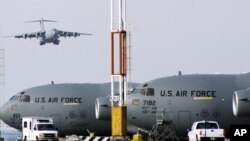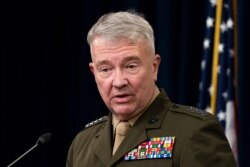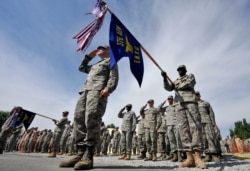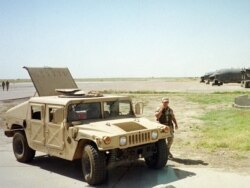As the United States moves to withdraw its last forces from Afghanistan, it is eyeing Central Asia more closely than at any other time since the early 2000s as a potential launching pad for residual counterterrorism operations in the region.
But planning is complicated by these countries’ skepticism of Washington, which some in the region view as an unreliable partner. And Russia and China, both of which exercise considerable influence in Central Asia, are unlikely to welcome an increased U.S. military presence in what they regard as their backyard.
On May 12, David Helvey, acting assistant secretary of defense for Indo-Pacific affairs, whose portfolio includes Central Asia, told the House Armed Services Committee that there are no arrangements with Afghanistan’s neighbors yet to allow U.S. troops or surveillance.
“We’ll still have the ability to prosecute terrorism from positions around the region. Looking at what that footprint is going to be ... an important part of the equation,” said Helvey.
The Pentagon, Helvey told lawmakers, is looking at areas “closer into Afghanistan,” without naming specific countries.
Marine General Kenneth McKenzie, commander of U.S. Central Command, also confirmed that Washington is exploring options to keep assets in Central Asia to respond to any threats.
“We have none of those agreements in place,” he told Congress April 20.
McKenzie explained that the U.S. needs overhead intelligence, surveillance and reconnaissance platforms in the region, which could include large, manned aircraft and drones.
The U.S. State Department, which is leading the talks, told VOA the United States is reorganizing its counterterrorism posture to prevent the reemergence of terrorist threats.
“We will continue to engage partners, allies and key states around the world —including in Central Asia — on how best to address it," a statement said.
Officials at State stress that “Afghanistan’s neighbors share our interest in countering international terrorism, especially threats from ISIS and al-Qaida.”
Washington has military cooperation and overflight agreements with all Central Asian countries except Kyrgyzstan, which ended them in 2014, closing a U.S. airbase in Bishkek.
Retired Ambassador Richard Hoagland, former principal deputy assistant secretary of state for South and Central Asian affairs, says it makes sense to negotiate access to Central Asian countries’ bases, as needed.
“But I would not foresee establishing full-scale American bases as we did post-9/11 at Karshi-Khanabad in Uzbekistan and at Manas in Bishkek, Kyrgyzstan,” Hoagland told VOA.
“China, and especially Russia, would oppose U.S. bases and likely put heavy pressure on Central Asian governments. But permission for access, as needed, is quite different from full-scale bases.”
Uzbekistan hosted the American military during the initial years after the September 11, 2001, attacks but later expelled the U.S. from Karshi-Khanabad amid strong political disagreements over a violent 2005 crackdown on protesters in Andijan.
But from 2001 to 2015, Germany, a NATO ally, continued to use a base in Termez, Uzbekistan, which also supported Dutch forces in Afghanistan. From 2002 to 2013, France maintained a small base outside Dushanbe, Tajikistan.
Jennifer Murtazashvili, associate professor at the University of Pittsburgh, notes that while “Uzbekistan and Kyrgyzstan hosted [bases] immediately after 2001, the threats are different now.”
Unlike Kazakhstan, Kyrgyzstan, and Tajikistan, Uzbekistan is not a member of the Moscow-led Collective Security Treaty Organization. But Tashkent would have to rewrite its laws to host foreign forces because current legislation bans it.
Murtazashvili says Uzbekistan’s direct relationship with the Taliban allows Tashkent to deal with threats from Afghanistan regardless of who is in power in Kabul.
“This departs from the [former Uzbek President Islam] Karimov era when Tashkent had little to do with the Taliban and saw Afghanistan primarily as a threat,” she said.
Tashkent prides itself on a new Afghan policy and maintains open channels of dialogue with Afghanistan’s armed opposition, said Ismatilla Irgashev, Uzbek President Shavkat Mirziyoyev’s special representative on Afghanistan.
“We have common interests with them as well,” Irgashev told VOA. “They want peace in their country and peace with us as a neighbor.”
“Like it or not, the Taliban is part of Afghanistan, still fighting for a political role. It took a long time for our partners, including the U.S., to come to terms with this reality.”
But Murtazashvili assesses that Central Asian policymakers “no longer see a consistent foreign policy from Washington,” and doubts regional governments regard it as a reliable partner, despite strategic partnership agreements.
“This further increases risks and uncertainties for countries,” Murtazashvili argued.
Russian President Vladimir Putin recently acknowledged that Afghanistan’s neighbors have good reason to be worried about insecurity in the region following the U.S. withdrawal.
"It goes without saying that this is a justified concern," Putin told Tajik President Emomali Rahmon in Moscow on May 8.
Putin stressed that Moscow would back Tajikistan, where Russian forces maintain their largest overseas contingent, the 201st Military Base. The complex dates to World War II and hosts an estimated 7,500 troops. Russia also has an airbase in Kant, Kyrgyzstan, where it has maintained a presence since the 1940s.
China, too, has intensified its military role in the region, constructing facilities in Tajikistan and joining exercises with Central Asian and Afghan forces.
“While Russia and China may benefit from the security protection a U.S. base may afford, it would come at substantial risk to those countries’ own geopolitical ambitions,” said Murtazashvili.
“Afghanistan is one area where Russia, China and the U.S. have significant mutual interests, but the question is whether those interests are so great that they would permit Washington to host a new base in the region. I think this is unlikely."
Irgashev told VOA that Tashkent hopes the Biden administration will keep common interests in mind, listen closely to its partners in the region and continue engaging them through C5+1 — a six-way dialogue among Washington and five Central Asian countries.








